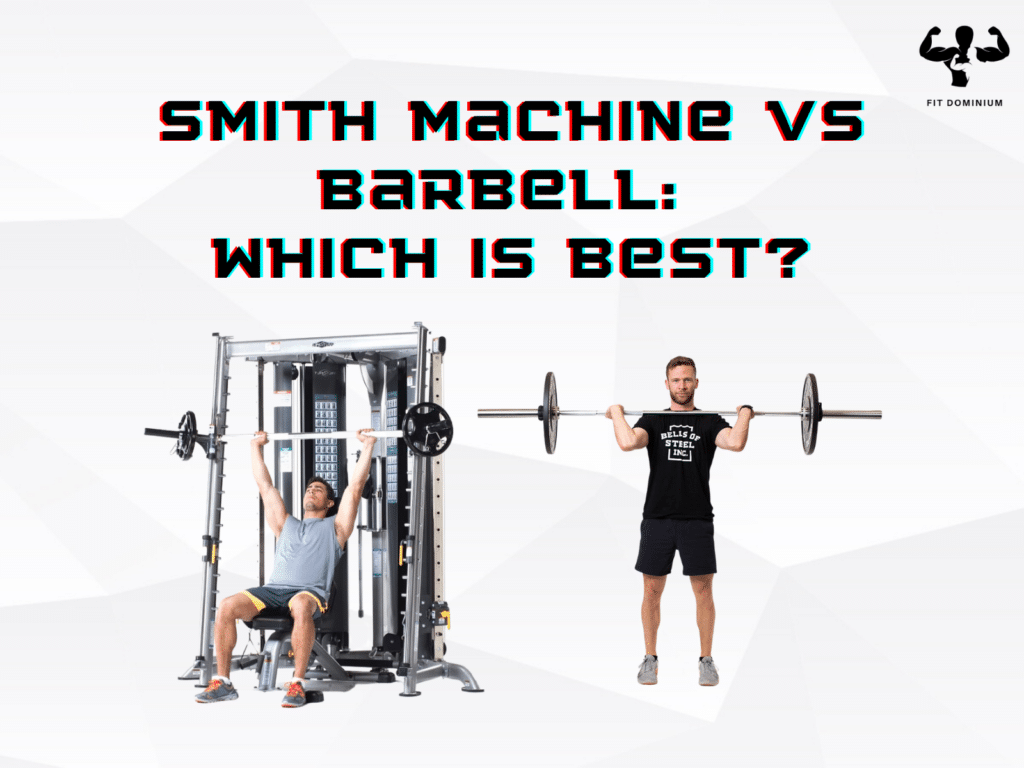
When it comes to leg day at the gym, the choice between a barbell squat and a Smith machine squat can seem like a pivotal decision. Each option presents unique advantages and challenges. The barbell squat grants you full control over the bar and weights, demanding precision and balance. It tests your body’s natural squat pattern, engaging core and stabilizer muscles to maintain equilibrium.
On the other hand, the Smith machine squat offers the security of a fixed barbell, reducing the risk of toppling over. It may even provide a pathway to isolate specific muscles more effectively. But there’s a catch—some argue it imposes an unnatural movement pattern.
In this comprehensive guide, we will explore the differences between the Smith machine squat and the barbell squat, helping you make an informed decision about which one suits your fitness goals best.
Smith Machine vs. Barbell: What’s The Difference?
Total Weight
The main difference between the Smith machine squat and the barbell squat is the total weight you’re lifting. In a barbell squat, you handle both the barbell and the weights you add to it. So, lifting and stabilising the entire load is all on you. With the Smith machine, you only lift the weights because the bar is fixed. This can affect how challenging your workout feels. If you want a tougher lift that works your stabilizing muscles more, go for the barbell squat.
Stability
Being steady while squatting is super important. In a barbell squat, you’ve got to balance the barbell yourself as you squat down and back up. This forces your core and stabilizer muscles to kick in, which is great for some folks. But if you’re not so good at balancing, it might be a bit tricky. Now, the Smith machine helps by guiding the bar along a set path. This makes it easier to keep your balance, especially if you’re new to squatting or have concerns about staying steady.
Range Of Motion
Range of motion means how much you can move during the exercise. With a barbell squat, you can move the barbell naturally, which can work many different muscles and make you more flexible. But the Smith machine limits your movement to a fixed path up and down. Some people like this because it helps them focus on specific muscles. It also reduces the chance of doing the squat wrong.
Ease Of Use
How easy these squats are can be different, too. The Smith machine can be simpler, especially for beginners or people new to squatting. It doesn’t need as much balance and coordination because the bar follows a set path. But getting the hang of proper form for a barbell squat can take some time and practice. However, once you nail it, it can give you a great workout and help you get stronger in a practical way.
Smith Machine Squat vs. Barbell Squat
Barbell Squat Benefits
Functional Strength
Barbell squats are renowned for their ability to increase functional strength. This means they mimic real-life movements, making daily activities easier. Whether you’re picking up groceries, playing with your kids, or even just getting up from a chair, the strength you gain from barbell squats can directly translate into enhanced everyday functionality. It’s not just about looking strong; it’s about being strong for life.
Core Activation
When you do barbell squats, your core muscles have to work hard to keep you steady. This not only strengthens your abs but also makes your deeper core muscles strong. It’s like giving your core a complete workout, improving your posture and reducing the chances of back problems.
Barbell Squat Techniques
Set-Up
Start by placing the barbell on your upper back to do a proper barbell squat. Your barbell grip should be somewhat wider than shoulder-width apart. Make sure your feet are hip-width apart. This first step is important because it establishes a solid foundation for your squat.
Execution
As you lower yourself into the squat, bend your knees and hips simultaneously. Go down until your thighs are parallel to the ground, and then push through your heels to come back up. Keep your core tight and your back straight.
Smith Machine Squat Benefits
Isolation
One significant advantage of the Smith machine squat is its capacity for isolating specific leg muscles effectively. This makes it an excellent choice if you want to target particular areas of your legs, such as the quadriceps or glutes. By controlling the bar’s path, you can fine-tune your squat to emphasize the muscles you want to work on the most.
Safety
The Smith machine is like your workout safety net. It usually has adjustable catches that stop the bar from going too low in case you can’t finish a rep. This feature is especially helpful if you’re working out alone; it keeps you from getting stuck under the weight.
Smith Machine Squat Technique
Set-Up
To get ready for a Smith machine squat, stand under the machine’s bar, just like you would with a barbell. Place the bar on your upper back and make sure your feet are shoulder-width apart. This is your starting position.
Execution
Push the bar upwards against the fixed rails to lift the weight. To lower it, bend your knees and hips. Then, push it back up again. Keep your core tight and maintain good form throughout the exercise. The Smith machine guides your movements, ensuring everything stays controlled and safe.
Is Smith Machine Squat Easier?
Yes, the Smith machine squat is often seen as easier because it guides the barbell’s path, making it more stable. However, this doesn’t mean it’s less effective. It’s just different and can be a great choice for various fitness levels and goals.
Why Is It Seen as Easier?
The Smith machine has a fixed path, so you don’t need to worry about balancing the bar like you do in a regular barbell squat. This can make it feel safer and less challenging, especially if you’re new to squats or recovering from an injury.
Why It’s Still Effective:
Safety and Confidence: The Smith machine is great for beginners and those coming back from injuries because it reduces the risk of accidents, letting you focus on your form and build confidence.
Isolation and Targeting: You can adjust the Smith machine to target specific leg muscles precisely. This is helpful if you want to work on certain areas, like your quads or glutes.
Rehabilitation: Physical therapists often use the Smith machine for rehab because it’s safe and controlled, which is essential for recovery.
Variety: Even if you’re experienced, adding Smith machine squats to your routine can be a nice change. It challenges your muscles differently and helps avoid boredom.
In short, the Smith machine squat might be easier to start with, but it’s still effective for building strength and targeting specific muscles. Your choice depends on your fitness level and what you want to achieve.
Which Squat Variation Should You Use?
For Beginners
If you’re just starting with squats or you’re worried about balance and form, the Smith machine squat is a great way to begin. It’s like training wheels for squatting. The fixed bar path means you won’t wobble or fall over. You can concentrate on getting your form right and gradually build strength without the fear of toppling.
For Muscle Growth
The barbell squat is your go-to if you want bigger leg muscles and a full leg workout. It allows your body to move freely, engaging lots of stabilizing muscles along with the main leg muscles. This works your legs and activates your core, lower back, and even upper body to keep you steady. It’s like a one-stop shop for muscle growth.
For Rehab
If you’re recovering from an injury, the Smith machine squat can be your safe haven. Its fixed barbell and safety catches lower the risk of hurting yourself while working out alone. It’s a way to rebuild your strength and mobility without straining your injury. But always, always check with a healthcare pro or physical therapist to make sure it’s right for your rehab plan.
Final Thoughts On Barbell vs. Smith Machine
The choice between the barbell squat and the Smith machine squat ultimately depends on your fitness goals and personal circumstances. Both exercises offer benefits, and incorporating both into your routine can provide a well-rounded leg workout. Always prioritize proper form and safety, regardless of your choice. Consult with a fitness professional to ensure you’re using the most suitable squat variation for your needs and goals.
References
- 7 Benefits of Doing Squats and Variations to Try. Retrieved from https://www.healthline.com/health/exercise-fitness/squats-benefits
- Smith Machine Squat: Benefits, Muscles Worked, and More. Retrieved from https://www.inspireusafoundation.org/smith-machine-squat/
- A User’s Guide to Getting the Most Out of Your Smith Machine. Retrieved from https://sunnyhealthfitness.com/blogs/products/smith-machine-user-guide
FAQs
Can I use the Smith machine for other exercises besides squats?
Yes, the Smith machine can be used for various exercises like bench presses, shoulder presses, and lunges, among others. Its guided bar path can be advantageous for certain movements.
Are there any drawbacks to using the Smith machine for squats?
One potential drawback is that the fixed bar path in the Smith machine may not mimic natural body movements as closely as free weights. Additionally, over-reliance on the Smith machine may limit the engagement of stabilizing muscles.
Can I build as much strength with the Smith machine squat as with the barbell squat?
While you can build strength with the Smith machine squat, it may engage a different degree of stabilizing muscles and overall body coordination than the barbell squat. The choice depends on your specific strengths, goals, and preferences.
Can I do jump squats or box jumps on the Smith machine?
It’s not recommended. The Smith machine isn’t suitable for jumping exercises. Doing these exercises with free weights or on a stable surface meant for jumping is better.
Are there differences in muscle activation between Smith machine squats and barbell squats?
Yes, there can be. Smith machine squats emphasize the front thigh muscles more, while barbell squats engage various leg and core muscles for balance. However, it varies from person to person and depends on form and body mechanics.
I am a simple man. I like cool gyms, good workouts, and helping people out. I have experimented with just about every type of fitness ranging from pro athletics to crossfit, calisthenics to golf, and everything in between.

